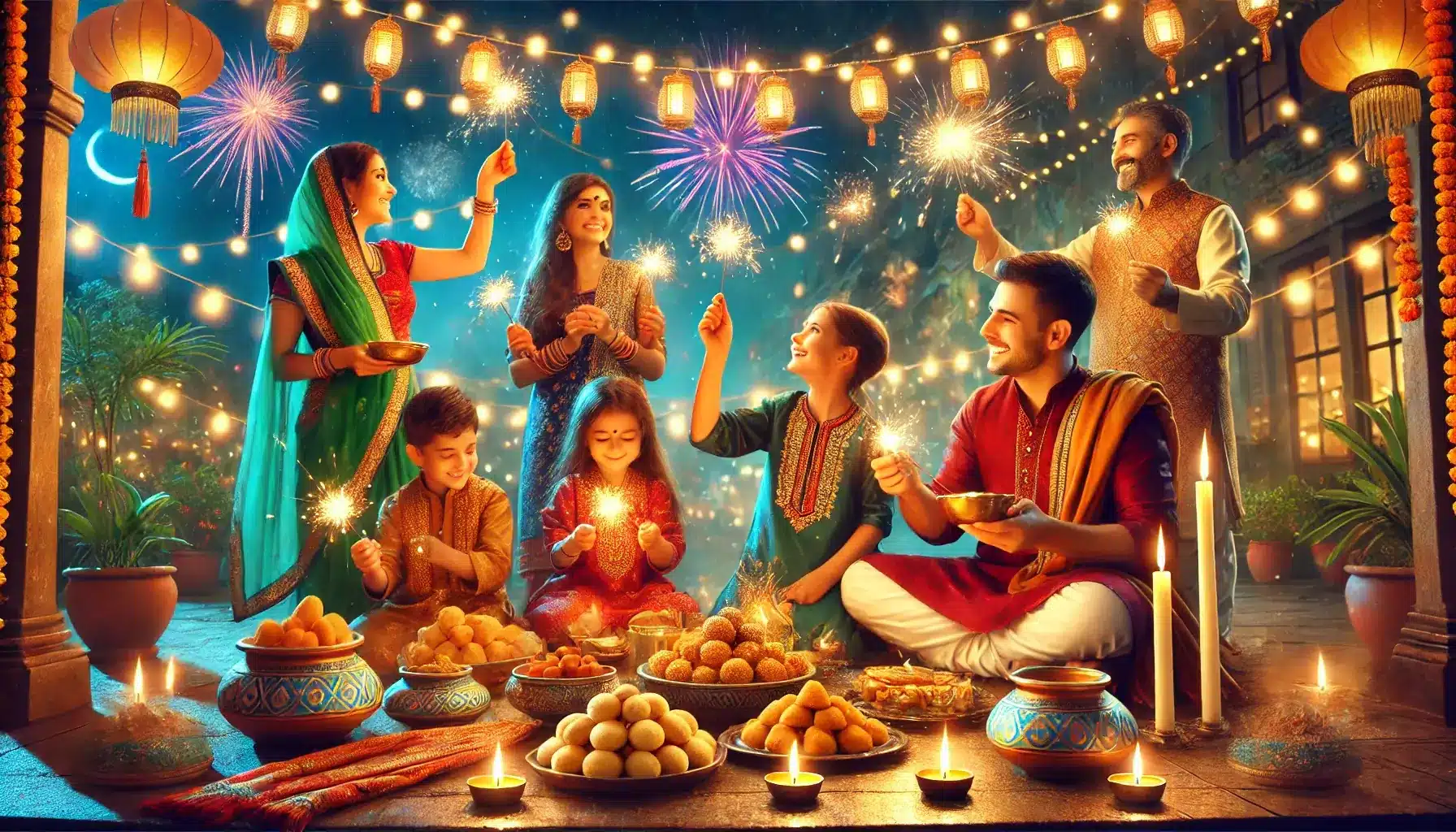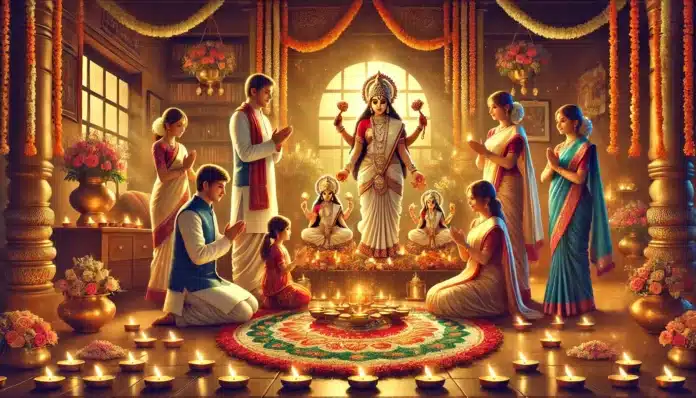There’s a magical spirit that envelops the world as you prepare to celebrate Diwali, the Festival of Lights. This vibrant occasion signifies a time of renewal, prosperity, and the triumph of good over evil. Enriched with rich traditions and rituals, Diwali invites you to illuminate your life with joy and positivity. From the flickering diyas to the festive gatherings, each aspect of this festival holds profound meaning, allowing you to connect with your heritage while fostering unity and hope for a brighter future.
Lakshmi Puja Muhurat for Diwali 2024: Auspicious Timings for Wealth and Prosperity
For Diwali 2024, the auspicious time to perform Lakshmi Puja is on Friday, November 1st, during the Pradosh Kaal from 5:45 PM to 8:20 PM. This period is considered the most favorable for worshipping Goddess Lakshmi as it aligns with the Amavasya (New Moon) Tithi, which begins on October 31 at 03:54 PM and ends on November 1 at 06:18 PM. For those following the Nishita Kaal (late night) muhurat, the timings are from 11:45 PM to 12:35 AM( Drik Punchang)
Key Takeaways:
- Mythological Significance: Diwali commemorates various mythological events, including the return of Lord Rama to Ayodhya and the victory of Lord Krishna over evil.
- Cultural Traditions: The festival is celebrated over five days with unique rituals, such as lighting diyas, creating rangoli, and performing Lakshmi Puja for prosperity.
- Global Festivities: Diwali is celebrated worldwide, reflecting its universal message of light and unity across diverse cultures from the US to Nepal.
- Environmental Awareness: There is a growing movement towards eco-friendly celebrations, emphasizing the adoption of sustainable practices during Diwali festivities.
- Message of Hope: Diwali encourages spreading positivity, kindness, and compassion, reminding us to foster harmony and goodwill in our communities.
Mythological and Historical Roots of Diwali
While exploring the rich tapestry of Diwali’s mythological and historical roots, you will find that this festival celebrates the triumph of good over evil. One prominent story is that of Lord Rama, who returned to Ayodhya after defeating the demon king Ravana, prompting joyous citizens to light diyas to welcome him. Similarly, the victory of Lord Krishna over Narakasura signifies the eradication of malevolence. Embracing diverse traditions, Diwali also holds significance in Jainism and Sikhism, all centered on the universal theme of light dispelling darkness and igniting hope in your heart.
Significance of Diwali
Your celebration of Diwali transcends mere festivities; it serves as a poignant reminder of the victory of light over darkness and good over evil. As you light diyas and clean your home, you embrace new beginnings and the cleansing of past burdens. This festival encourages you to reflect on the triumph of knowledge and righteousness, promoting a life filled with kindness and truth. Diwali’s message resonates deeply, inviting you to dispel ignorance and negativity while welcoming prosperity and joy into your life and community.
The Five Days of Diwali
There’s a vibrant spirit that envelops the five days of Diwali, with each day embodying its own significance and traditions. Beginning with Dhanteras and culminating in Bhai Dooj, these days form a journey filled with rituals, joy, and reflection. Each celebration offers you a unique way to connect with family and your community, as the festival represents the triumph of light over darkness and the nurturing of relationships.
Dhanteras
By celebrating Dhanteras, you embrace wealth and prosperity, as people buy new items to invite good fortune into their lives. It sets the tone for the Diwali festivities, emphasizing the importance of health and well-being through worship of Lord Dhanvantari.
Naraka Chaturdashi
The significance of Naraka Chaturdashi, also known as Choti Diwali, lies in its celebration of the victory of Lord Krishna over the demon Narakasura, symbolizing the defeat of evil. You may find homes adorned with rangoli designs and lamps, as these decorations are believed to protect against negativity.
Indeed, this day encourages you to reflect on the light in your life while fending off darkness. As you prepare for the festivities, the lighting of lamps and fireworks brings a sense of excitement and collective joy, uniting families and communities under the shared celebration of triumph and renewal.
Lakshmi Puja
Along with the main Diwali festivities, Lakshmi Puja holds a central place, where you honor Goddess Lakshmi, the deity of wealth and prosperity. You participate in prayers, decorate your home with lights, and enjoy feasts with loved ones, all while seeking her blessings for a bountiful year ahead.
This special evening is often the highlight of your Diwali celebrations. By performing Lakshmi Puja, you not only invite prosperity into your life, but you also reinforce the importance of gratitude and togetherness, as you share these moments with your family and friends around you.
Govardhan Puja
At Govardhan Puja, you celebrate the protective nature of Lord Krishna, who lifted the Govardhan Hill to shield his devotees from heavy rains. It’s a day filled with gratitude and joy, often coinciding with the new year as per the Vikram Samvat calendar.
Due to its association with new beginnings, this day often includes exchanging gifts and well wishes with family and friends. It’s a reminder for you to nurture bonds and start fresh, surrounded by the warmth of your loved ones, ushering in a sense of renewal as you commence on the upcoming year.
Bhai Dooj
Any celebration of Diwali concludes with Bhai Dooj, a day dedicated to the special bond between brothers and sisters. As a sister, you pray for your brother’s well-being, while he commits to protecting and cherishing you, reinforcing familial love and support.
And this heartfelt gesture strengthens your relationships, reminding you of the importance of caring for one another. This day encapsulates the essence of Diwali as a festival of togetherness, showcasing that behind every celebration, it’s the bonds of family that truly illuminate your life.
Rituals and Traditions of Diwali
All across India and among communities worldwide, Diwali is celebrated with vibrant rituals and traditions that invite joy and prosperity into your home. You begin by lighting diyas and candles to symbolize the triumph of knowledge over ignorance. Creating colorful rangoli designs welcomes guests and deities while sharing sweets and gifts strengthens social bonds. On the night of Lakshmi Puja, you offer prayers to Goddess Lakshmi, seeking her blessings for wealth and success. These cherished practices not only enhance the festive spirit but also foster unity and a sense of community during this joyous occasion.
Modern Celebrations of Diwali Around the World

Now, you can experience Diwali’s vibrant spirit beyond India as it is celebrated by communities across the globe. In countries like the United States, United Kingdom, and Australia, grand events showcase cultural performances and festive markets that bring people together. In Singapore, Malaysia, and Fiji, Diwali is even recognized as a public holiday, marked by lively parades and joyous celebrations. As you partake in these festivities, you’ll see how Diwali’s message of light, unity, and hope transcends borders, enriching diverse cultures and fostering a sense of community.
Environmental Consciousness of Diwali
Many individuals are becoming increasingly aware of the environmental effects of traditional Diwali celebrations, particularly regarding fireworks that contribute to pollution. As you celebrate this vibrant festival, consider adopting eco-friendly practices such as using earthen lamps and organic rangoli colors to minimize your carbon footprint. Participating in the growing trend towards a “Green Diwali” allows you to enjoy the festivities while also promoting sustainability. By embracing these practices, you can help ensure that the joy of Diwali is not only experienced today but also preserved for future generations.
Conclusion
Upon reflecting on Diwali: The Festival of Lights, Prosperity, and New Beginnings, you can appreciate its profound significance in promoting light over darkness and goodness over evil. This joyous celebration invites you to embrace new beginnings, fostering a sense of togetherness and renewal in your life. As you partake in the traditions of lighting diyas, sharing sweets, and gathering with loved ones, let the essence of Diwali inspire you to spread kindness and compassion, illuminating not only your surroundings but also the hearts of those around you.
FAQ
Q: What is the significance of Diwali in different cultures?
A: Diwali, known as the festival of lights, holds varying significance across cultures. In Hinduism, it celebrates the return of Lord Rama to Ayodhya after defeating the demon king Ravana. In Jainism, it marks the attainment of Nirvana by Lord Mahavira. For Sikhs, Diwali commemorates the release of Guru Hargobind Ji from imprisonment. Each tradition emphasizes the victory of light over darkness and good over evil, reinforcing a universal message of hope and renewal.
Q: How is Diwali celebrated over its five-day span?
A: Diwali celebrations occur over five days, each with its unique customs. The first day, Dhanteras, focuses on wealth and prosperity, where people purchase new items. The second day, Naraka Chaturdashi, signifies the defeat of the demon Narakasura, with homes decorated and lamps lit. The third day, Lakshmi Puja, is the main festival day dedicated to Goddess Lakshmi, featuring prayers and festivities. The fourth day celebrates Govardhan Puja, marking Lord Krishna’s protection of villagers. Finally, Bhai Dooj honors the bond between siblings, with sisters praying for their brothers’ well-being.
Q: What are the traditional rituals involved in Diwali celebrations?
A: Diwali is rich in rituals that enhance its festive spirit. Key traditions include lighting diyas (oil lamps) to symbolize the triumph of knowledge over ignorance, creating rangoli designs to invite positivity, and bursting fireworks to drive away negativity. Additionally, families perform Lakshmi Puja by offering sweets and flowers to Goddess Lakshmi, and exchanging sweets and gifts promotes social bonding and happiness among friends and family.
Q: How is Diwali celebrated worldwide?
A: Diwali has transcended borders and is now celebrated globally, with communities organizing grand events in countries like the United States, United Kingdom, Australia, and Canada. In places like Singapore and Malaysia, Diwali is recognized as a public holiday, featuring vibrant parades and cultural performances. Each community brings its unique flavor to the celebrations, emphasizing the festival’s themes of light and unity, and reaching out to local populations to share the joy of Diwali.
Q: What are the eco-friendly practices being adopted during Diwali celebrations?
A: In response to increasing awareness of environmental issues, many individuals are adopting eco-friendly practices for Diwali. These include using clay diyas instead of plastic lights, opting for organic colors for rangoli, and minimizing the use of fireworks to reduce air and noise pollution. The “Green Diwali” movement encourages celebrations centered on family gatherings, prayers, and the use of sustainable materials, promoting a message of environmental responsibility alongside the traditional festivities.


